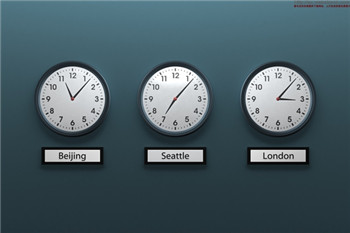(单词翻译:单击)

Jet lag may be the worst part of traveling. And it hits many people harder traveling east than west. Why they feel this way is unclear. But scientists recently developed a model that mimics special time-keeping cells in the body and offers a mathematical explanation for why traveling from west to east feels so much worse. It also offers insights on recovering from jet lag.
时差应该是旅行中最讨人厌的事了。许多向东行的人又比往西走的更容易受时差影响。我们并不清楚为何这些人会有这种感受,不过科学家近来设计出一套模型,来模仿人体内专门计时的细胞,用数学说明为什么从西向东走造成的时差更难捱。这项研究也让我们更加了解该如何倒时差。
Deep inside the brain, in a region called the hypothalamus (right above where our optic nerves cross) the internal clock is ticking. And approximately every 24 hours, 20,000 special pacemaker cells that inhabit this area, known as the suprachiasmatic nucleus, synchronize, signaling to the rest of the body whether it’s night or day. These cells know which signal to send because they receive light input from our environments — bright says wake, dark says sleep.
在人脑中央深处有个叫做下丘脑的部位(就在视神经交叉处正上方),人体自带的时钟就在这里运转。大约每隔24小时,2万个位于下丘脑“交叉上核”的特殊节律调节细胞就会同步一次,向身体其他部位发出信号,告知身体现在是白天还是黑夜。这些细胞知道该打什么信号,因为它们从环境中接收到光线刺激,明亮时就表示人该醒着,昏暗时就该睡觉。
But when you travel across multiple time zones, like flying from New York to Moscow, those little pacemaker cells that thought they knew the routine scramble around confused before they can put on their show. The whole body feels groggy because it’s looking for the time and can’t find it. The result: jet lag.
然而,当我们跨过好几个时区,譬如从纽约飞到莫斯科的时候,这些自以为通晓例行公事的节律细胞就被打乱了,不知该怎么办才好。我们的身体也糊涂了,因为它想要对时,却不知道是什么时间。结果就导致了时差。
Most of our internal clocks are a little bit slow, and in the absence of consistent light cues — like when you travel across time zones — the pacemaker cells in your body want to have a longer day, said Michelle Girvan, a physicist at the University of Maryland who worked on the model published in the journal Chaos on Tuesday.
马里兰大学的物理学家米歇尔‧葛文(Michelle Girvan)参与了建构这套模型的工作,研究成果周二时在《混沌》(Chaos)期刊上发表。葛文表示,我们体内大部分内建时钟都稍微慢些,在没有持续稳定的光源信号时,比如跨时区旅行的时候,体内的节律细胞就会想让一天更长一些。
“This is all because the body’s internal clock has a natural period of slightly longer than 24 hours, which means that it has an easier time traveling west and lengthening the day than traveling east and shortening the day,” Dr. Girvan said.
“这全是因为人体内建时钟的自然周期比24小时稍长一些,也就是说,在向西旅行、导致一天的长度拉长时,感觉会比向东旅行导致一天缩短时更好受一些。”
Jet lag can be resolved by matching your internal clock to your destination’s clock as soon as possible. (There’s an app for that). So the researchers built a model that considers all of your pacemaker cells, how sensitive you are to light, the brightness of light, multiple time zones and people’s slightly off kilter internal clocks. They hope the model offers a simple way of explaining how a typical body might recover from jet lag with no intervention. That is, how its pacemaker cells try to synchronize in the presence of different light cues (like sunshine, artificial light or dim light from clouds) when arriving at various time zones three hours, six hours, nine hours and 12 hours away either to the east or west.
要解决时差问题,你可以让体内时钟尽快调整到与目的地的时间同步(有个智能应用可以帮忙)。所以研究人员建立了一个模型,将你的节律细胞、你对光线的敏感度、光线强度、跨越时区的多寡,以及我们稍稍失准的体内时钟全都纳入考虑。他们希望这个模型可以提供一个简洁的方式,来解释正常人的身体如何在没有外在干预的情况下,把时差倒回来。也就是说,我们在抵达与出发地相差3小时、6小时、9小时、12小时的目的地之后,不论旅程是向东或向西,身体节律细胞是如何根据新地点不同的光线信号(比如阳光、人造光,或云层筛落的黯淡光线)进行同步的。
The model confirms what was already known: Generally, westward recovery is easier than eastward. But it also helps us understand that flying across more time zones can sometimes be easier than traveling across fewer.
这个模型证实了我们已知的事实:一般来说,向西飞行导致的时差会比向东飞行的时差更容易克服。但它也让我们了解到,有时跨度大的时差反而会比差距较小的时差更容易适应。
For example, it would take you about eight days to recover from a westward trip across nine time zones, if you did nothing to fight it. But if you cross the same number of time zones going east, recovery would take more than 13 days, according to the model. This recovery time is worse than if you flew smack across the globe, crossing 12 time zones, which is about the distance from New York to Japan.
比方说,根据这个模型,在没有任何额外努力的情况下,要把向西跨越了9个时区的旅程造成的时差倒过来,需要大约8天的时间。不过要是你向东跨越了同样多的时区,想倒时差就得花至少13天。这比你环绕半个地球、跨越12个时区(大约是纽约到日本的距离)所需的恢复时间更长。
Confusing? The model shows that your body is confused, too, as your cells try to adjust to new light cues in different places. It also shows that a trip less than 12 hours going east is going to feel worse than the same time going west.
看懵了吗?从这个模型看得出来,你的身体在试着适应不同地方的新光线信号时也很懵。模型还显示出,一趟短于12小时、向东行的旅程,会比花费相同时间向西行更令人难受。
It all comes back to whether you’re a lark — an early riser — or an owl, and “most people are a little owlish,” said David Welsh, a neuroscientist at the University of California, San Diego, who studies the body’s pacemaker cells and was not involved in the study.
加州大学圣地亚哥分校的神经科学家戴维‧威许(David Welsh)说,时差的影响有多大,最终还取决于你是只早起的鸟儿还是夜猫子,“而大部分人都有点儿爱熬夜”。 威许研究身体节律细胞,不过他没有参与前述研究。
If you’re traveling across several time zones, like from New York to Moscow, and you want to start feeling normal sooner, “you really want to experience that external stimuli appropriate to your new time zone as quickly as possible,” said Dr. Girvan. And that sometimes means owls succumbing to early nights.
如果你要进行跨越好几个时区的旅行,比如从纽约到莫斯科,而你希望快点恢复正常感受,“你就要尽快去体验与新时区作息相符的外在刺激”,葛文说。对于夜猫子来说,这有时就意味着早点上床。


